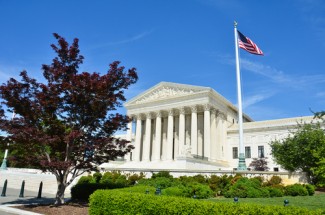ABA asks Supreme Court to curtail expansion of forfeiture laws

Image from Shutterstock.
The ABA has asked the U.S. Supreme Court to curtail the federal government’s use of pretrial restraint orders to freeze a defendant’s lawfully obtained assets.
In an amicus brief (PDF) filed with the court Tuesday, the ABA contends that prior restraint of a defendant’s untainted assets runs afoul of the Fifth Amendment guarantee that federal criminal proceedings must be fundamentally fair and the Sixth Amendment right to counsel of choice.
The government should “prevail by proving its allegations, not by impeding an accused’s ability to mount a defense,” the brief says.
The brief was filed in support of Sila Luis, who was indicted on federal charges in Florida related to Medicare fraud. The indictment included forfeiture allegations that essentially covered all of Luis’ assets.
The district court froze both Luis’ “tainted” and “untainted” assets, and the Atlanta-based 11th U.S. Circuit Court of Appeal affirmed the decision.
The ABA says it takes no position on the merits of Luis’ criminal case nor challenges the federal government’s efforts to freeze “tainted” assets gained through alleged criminal activity. Rather, it contends that the lower courts erred in allowing prosecutors to invoke “pretrial exercise” over assets that were lawfully obtained. That distinction is pivotal, it says.
“This case represents a profound expansion of the government’s pretrial exercise of control over a defendant’s assets,” the brief says. “Unlike previous asset forfeiture cases this court has considered, the pretrial restraining order in this case covers not only tainted assets, but also bars the use of lawfully obtained, untainted property to secure representation by counsel of choice.”
The ramifications for the criminal justice system of permitting pretrial restraint of untainted assets are pervasive and uniquely harmful, the brief adds. “If the government can restrain pretrial a defendant’s use of untainted assets to retain counsel of choice, then the government is effectively granted the capability to deprive the accused of counsel of choice,” it says.
The brief also notes that the high court has never endorsed the proposition that defendants can be deprived of their use of lawfully obtained property to pay for counsel in criminal cases.
Updated on Aug. 26 to correct a typo in the defendant’s name.



